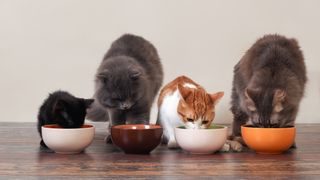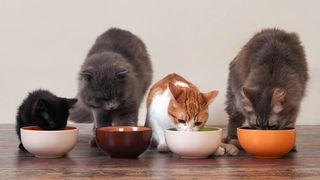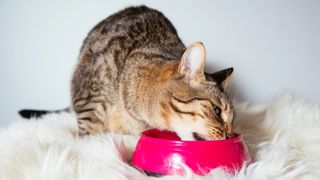Kitten food vs cat food: Does it matter what you give a moggy?
You may have pondered the kitten food vs cat food question but is there really any difference?

The question regarding kitten food vs cat food is an important one. You may be standing in a grocery store looking at the different food brands on sale and wondering if your kitten would be fine eating an adult cat diet. Or you may have opened your cupboard, seen only kitten food in there and pondered whether that would be fine for a senior.
Surely, cat food is cat food? Well, actually no. Although both are highly nutritious and jam-packed with all the vitamins, minerals and antioxidants your fur baby needs to thrive, ratios are crucial. It’s also important to feed cats and kittens the correct amount of protein and fat and the levels are very much determined by the age and stage of our feline friends.
So while feeding your kitten the best cat food or your cat the best kitten food on a one off occasion is unlikely to do any harm, it’s best to stick to giving your feline friend a dish that’s been specially formulated to meet their needs. So let’s look at the ins and out of kitten food vs cat food and why it’s a good idea to stick to what it says on the box.
Kitten food vs cat food: What’s the difference?
One of the biggest differences between kitten food and adult cat food is the proportion of protein and fat that each one contains. According to VCA Animal Hospitals, the recommended dry matter protein range for healthy kitten growth is 35 to 50% while the dry matter fat content should be between 18 and 35%. For adult cats (those over the age of one) a protein content of around 30 to 35% on a dry matter basis is suggested with 20 to 24% fat.
It means kittens need up to three times more calories than adult cats to fuel their rapid growth, which the extra protein and fat provides them with.
You’ll also find that kitten food has a higher ratio of certain vitamins and minerals than adult cat food does. Minerals like calcium and phosphorus are crucial to your kitten’s development, but these higher levels aren’t good for adult cats whose bodies are no longer growing.

Can you feed cat food to kittens?
A kitten’s nutritional needs are very different from their bigger brothers and sisters and they need far more nutrients and calories than adult cats do to help their bodies to grow and develop.
During these first 12 months, kittens expend huge amounts of energy, not just on growth but also on play. They need a lot more calories than adult cats to support all this energy expenditure, something that adult cat food doesn’t provide.
Cat food also tends to be lower in DHA, an omega-3 fatty acid that supports brain and vision development in kittens and kitten food is also much higher in the vitamins and minerals needed to build a healthy immune system.
While there are some formulas on the market that say they’re suitable for all life stages, we recommend that if you’re wanting to opt for one of these (perhaps because you have both a kitten and an adult cat in your family) that you check with your vet first to ensure it has everything your little one needs.
You can also take a look at our guide to which kitten food is best to get our vet’s take on choosing the most appropriate diet for your little one.
Can you feed kitten food to cats?

Adult cat food is geared towards one of two things: either maintaining health or providing extra support for certain health issues that a cat might be experiencing. The ratios of fat, protein, vitamins and minerals are all focused on maintenance as opposed to growth and the dish overall will be far lower in calories than kitten food to prevent obesity.
The good news is, that if your adult cat consumes kitten food occasionally, it won’t do them any harm. Unlike kittens, who miss out on vital nutrition when they eat adult cat food, an adult cat gobbling down kitten food won’t be putting their health at risk if they’re only being fed these dishes for short periods of time.
That being said, kitten food is at least 30% higher in calories than adult cat food, so if you were to feed your cat kitten food on an ongoing basis, they’d quickly start packing on the pounds. Your cat’s body will do a good job at expelling all the excess vitamins and minerals from kitten food that they don’t need, but the additional calories will definitely lead to weight gain.
When to switch from kitten food to cat food
Knowing how long should cats eat kitten food forcan be challenging because different breeds reach maturity at different ages. Most cats are considered to be kittens until around 12 months of age, but for some bigger breeds, like 7 of the largest cat breeds in the world, it can take around 18 to 24 months for them to reach adulthood.
As with all important decisions surrounding your furry friend, we recommend you consult your vet who will be able to help guide you as to when to transition your kitten over to adult cat food and how to do so safely. You can also seek help if you find a kitten not eating – it’s never a good idea to switch them on to cat food too early.
Struggling to know when to transition your kitten to adult cat food? Our guide to ‘how long should cats eat kitten food for?’ has the answers.
PetsRadar Newsletter
Get the best advice, tips and top tech for your beloved Pets

Kathryn is a freelance writer who has been a member of the PetsRadar family since it launched in 2020. Highly experienced in her field, she's driven by a desire to provide pet parents with accurate, timely, and informative content that enables them to provide their fur friends with everything they need to thrive. Kathryn works closely with vets and trainers to ensure all articles offer the most up-to-date information across a range of pet-related fields, from insights into health and behavior issues to tips on products and training. When she’s not busy crafting the perfect sentence for her features, buying guides and news pieces, she can be found hanging out with her family (which includes one super sassy cat), drinking copious amounts of Jasmine tea and reading all the books.
